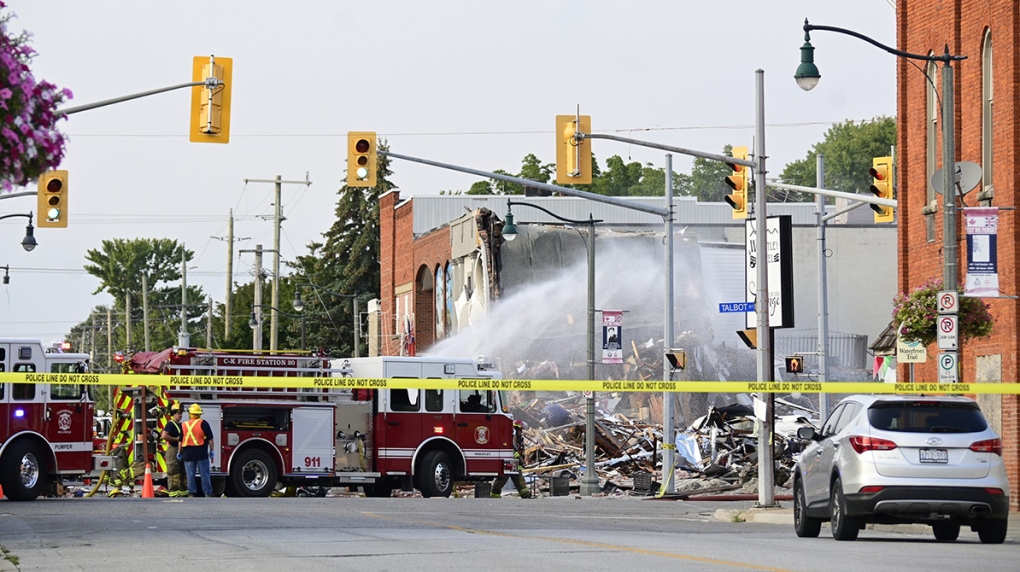Measures to address abandoned gas wells fall short, professor says
 The aftermath of an explosion in Wheatley, Ont. on Thursday, Aug. 26, 2021. (Source: Municipality of Chatham-Kent)
The aftermath of an explosion in Wheatley, Ont. on Thursday, Aug. 26, 2021. (Source: Municipality of Chatham-Kent)
New provincial legislation introduced to help address hazardous oil and gas wells remains short of what’s needed, according to an expert on the matter.
Changes to the Oil, Gas and Salt Resources Act give the Ministry of Natural Resources the power to immediately act on hazardous oil and gas wells in specific situations.
“We want to make sure that if there's an exceptional situation where we have someone, perhaps that's deceased, as a landowner or a company that has gone bankrupt or is insolvent, that we still have a method to access that well and do the work that needs to be done to keep people safe,” Graydon Smith, Ontario’s Minister of Natural Resources told CTV News.
A news release stated the changes will allow the province to recover the costs of any action taken on the well.
In some cases, Smith said wells are considered “high risk” and require remediation.
The minister noted the new power would not be required on a regular basis but could be used as a “tool” in specific situations.
However, Maurice Dusseault, an Adjunct Professor at the University of Waterloo, who has researched oil and gas well integrity, is skeptical about how useful the changes will be.
“It's not going to go away, but I don't think that the provincial legislation really can solve the cost and the liability issue because the vast majority of these abandoned wells have no owner,” Dusseault said.
He said the province has about 27,000 known oil and gas wells, and about 90 per cent are abandoned.
Dusseault noted many wells are likely in bad condition and some can lead to the emission of hydrogen sulfide.
A leak in a well can create a distinct odour noticed from hundreds of metres away, or in severe cases a more dangerous effect.
On Aug. 26, 2021, in Wheatley, a hydrogen sulfide gas explosion shook the community, leaving 20 injured and many unable to return home for a lengthy period.
An uncovered well on the site has since been plugged.
Dusseault said in some cases, there’s a need to do more than plug wells where there are leaks.
“Just simply plugging one well and plugging another is a bit like whack-a-mole,” Dusseault said.
“You stop it here and it's going to pop up over there because the pressure builds up underground.”
The professor would like to see the ministry turn to experts outside their office to create a more concrete plan.
As for the ministry, Smith said they are prioritizing wells on a regular basis with Wheatley in mind to try and avoid another dramatic event.
CTVNews.ca Top Stories

W5 Investigates 'Let me rot in Canada,' pleads Canadian ISIS suspect from secret Syrian prison
W5's Avery Haines tells the story of Jack Letts, a Canadian Muslim convert in a Syrian jail, accused of being a member of ISIS. In part two of a three-part investigation, Haines speaks with Letts, who issues a plea to return to Canada to face justice.
DEVELOPING Lebanon says 2 hurt as Israeli troops fire on people returning south after truce with Hezbollah
At least two people were wounded by Israeli fire in southern Lebanon on Thursday, according to state media. The Israeli military said it had fired at people trying to return to certain areas on the second day of a ceasefire with the Hezbollah militant group.
Dementia may arrive a decade earlier in men at high risk for heart disease, study finds
Being at higher risk of heart disease may cause dementia to appear in men a decade before it will occur in similarly at-risk women, a new study found.
Latest 'massive' Russian aerial attack cuts power to 1 million homes in Ukraine
Russia conducted a 'massive' attack against Ukraine’s energy infrastructure on Thursday, firing nearly 200 missiles and drones and leaving more than a million households without power, Ukrainian officials said.
'AI Jesus' avatar tests man's faith in machines and the divine
Would you trust an 'AI Jesus' with your innermost thoughts and troubles? Researchers and religious leaders on Wednesday released findings from a two-month experiment through art in a Catholic chapel in Switzerland.
A social media ban for under-16s passes the Australian Senate and will soon be a world-first law
A social media ban for children under 16 passed the Australian Senate Thursday and will soon become a world-first law.
DEVELOPING Liberals, NDP expected to pass GST holiday in House of Commons today, without $250 rebate
Legislation to create a two-month-long GST holiday is expected to pass today after the federal finance minister separated the GST break from a promise to also send $250 to most working Canadians in the spring.
Ford pushes for 'more proactive' border action after Trudeau meets with premiers about Trump
Ontario Premier Doug Ford is calling on the federal government to 'take a more proactive approach at the border' following a call Wednesday night between Prime Minister Justin Trudeau and all 13 premiers to discuss U.S. president-elect Donald Trump's tariff threat.
Montreal billionaire Robert Miller could have as many as 100 victims, lawyer says
A Quebec judge is hearing arguments this week in a class-action lawsuit application against Montreal billionaire Robert Miller over allegations he paid minors for sex.

































